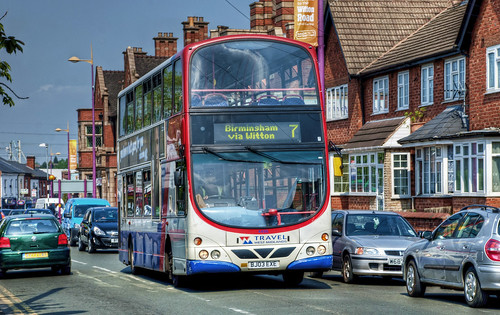City Paper's cover story on ways to improve the city
I have been remiss in not mentioning last week's cover story in the Washington City Paper, "How to Fix Everything: From track work to sex work, prescriptions for making D.C. a greater city," which features 30 ideas for improving the city. Some of them I've suggested before. Some of them are dumb (not many, you can decide which ones for yourself).
They were gracious and asked me to contribute. Of course, I could have written that many ideas issue by myself, and the #1 item was already taken, "Build More Metro Lines. Now."
So I wrote about repositioning and rebranding bus service, "Grow the Buses," based on this past blog entry ("Making bus service sexy and more equitable"), but in under 200 words, with punchier writing.
Left: Double deck bus in Hull, UK.
Here it is:
In North America, transit service is often seen as a social service for people who are poor and don’t own cars. Before 1960, transit ridership was high because people rode streetcars.

Ridership dropped significantly when streetcars were replaced by buses. Today, streetcar opponents say that buses are more mobile and cheaper. But they don’t talk about ridership and the quality of the ride.
Right: Double deck buses on Oxford Street, London. Flickr photo by DJ Greer.
Even the best implementations of highly touted “bus rapid transit” service haven’t significantly increased ridership. A bus duded up a wee bit is still unattractive to those with mobility choices.
We can change that by switching to double-deck buses, like the popular red ones in London. The double-deck bus is fun, unique, and frequently used—as it is in D.C.—for visitor-focused tours.
Tall buses wouldn’t be a problem on most D.C. streets because traffic signals hang at the side of the road. Immediately bus service would be repositioned as unique, special, and premium. (Of course, to make this reality, other service improvements would also have to be introduced simultaneously.) Instead of our buses being ordinary and boring, we’d have vehicles befitting a world capital. Think cool Britannia meets cool Washingtoniana.
--------
Too late, I realized I should have tried for 20 more words and suggested a pilot test of this idea on one major Metrobus route in the city, probably one where there is a bit less risk for problems--one of the complaints about double deck buses is that the upper floor doesn't have an attendant.
 Left: 7 Bus in Witton, Birmingham, UK. by brianac37, on Flickr.
Left: 7 Bus in Witton, Birmingham, UK. by brianac37, on Flickr.And I didn't have room to mention the biggest problem with this idea: repairing and storing the buses in the current bus yards and buildings, which aren't set up to handle buses of this height.
Note that by switching to double deck buses, capacity of the routes would increase, and the 14th St. bus garage would be unusable, which could lead to the property being redeveloped.
Right: -
However a new bus garage would have to go somewhere, anyway, because of plans to sell the Western Bus Garage, and desires to redevelop the 14th St. bus garage.
Councilmember Muriel Bowser made it impossible to locate a bus garage at a redeveloped Walter Reed. I don't understand why people don't see the necessity of providing a bus terminal if you do away with another bus terminal.
Similarly, Councilmember Kenyan McDuffie is trying to avoid putting a bus terminal at the Armed Forces Retirement Home campus... this doesn't bode well for transit, whether or not we shift to double deck buses.
----------------------
I think that this "How to Fix Everything" idea needs to be extended into a "book," broken down by category. Especially because most of the DC political campaigns by hopeful Mayors and City Councilmembers seem to be bereft of ideas.
Years ago, Philadelphia City Paper did a similar cover story "Let's Go," on improving transit, with 33 ideas. (Actually, I tried to get the Envision Baltimore group to propose a similar project to the Baltimore City Paper.)
And Coach House Books in Toronto had a book series called UTOpia, on ways to improve Toronto. The first book had the same idea as the City Paper cover story. The other books in the series were topical, on food, arts and culture, etc.
Labels: change-innovation-transformation, media and communications, transit, urban design/placemaking






5 Comments:
excellent- exactly what we need - more metro lines !! and lets do away with the HPRB and the Committee of 100 while we are at it. Oh- and let's allow people under 75 to take over the CHRS..
This comment has been removed by the author.
This comment has been removed by the author.
This comment has been removed by the author.
This comment has been removed by the author.
Post a Comment
<< Home